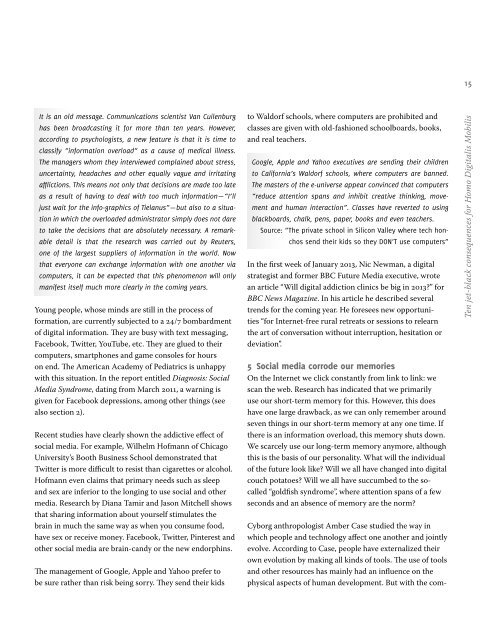VINT-The-Dark-Side-of-Social-Media-Alarm-Bells-Analysis-and-the-Way-Out
VINT-The-Dark-Side-of-Social-Media-Alarm-Bells-Analysis-and-the-Way-Out
VINT-The-Dark-Side-of-Social-Media-Alarm-Bells-Analysis-and-the-Way-Out
You also want an ePaper? Increase the reach of your titles
YUMPU automatically turns print PDFs into web optimized ePapers that Google loves.
It is an old message. Communications scientist Van Cuilenburg<br />
has been broadcasting it for more than ten years. However,<br />
according to psychologists, a new feature is that it is time to<br />
classify “information overload” as a cause <strong>of</strong> medical illness.<br />
<strong>The</strong> managers whom <strong>the</strong>y interviewed complained about stress,<br />
uncertainty, headaches <strong>and</strong> o<strong>the</strong>r equally vague <strong>and</strong> irritating<br />
afflictions. This means not only that decisions are made too late<br />
as a result <strong>of</strong> having to deal with too much information — “I’ll<br />
just wait for <strong>the</strong> info-graphics <strong>of</strong> Tielanus” — but also to a situation<br />
in which <strong>the</strong> overloaded administrator simply does not dare<br />
to take <strong>the</strong> decisions that are absolutely necessary. A remarkable<br />
detail is that <strong>the</strong> research was carried out by Reuters,<br />
one <strong>of</strong> <strong>the</strong> largest suppliers <strong>of</strong> information in <strong>the</strong> world. Now<br />
that everyone can exchange information with one ano<strong>the</strong>r via<br />
computers, it can be expected that this phenomenon will only<br />
manifest itself much more clearly in <strong>the</strong> coming years.<br />
Young people, whose minds are still in <strong>the</strong> process <strong>of</strong><br />
formation, are currently subjected to a 24/7 bombardment<br />
<strong>of</strong> digital information. <strong>The</strong>y are busy with text messaging,<br />
Facebook, Twitter, YouTube, etc. <strong>The</strong>y are glued to <strong>the</strong>ir<br />
computers, smartphones <strong>and</strong> game consoles for hours<br />
on end. <strong>The</strong> American Academy <strong>of</strong> Pediatrics is unhappy<br />
with this situation. In <strong>the</strong> report entitled Diagnosis: <strong>Social</strong><br />
<strong>Media</strong> Syndrome, dating from March 2011, a warning is<br />
given for Facebook depressions, among o<strong>the</strong>r things (see<br />
also section 2).<br />
Recent studies have clearly shown <strong>the</strong> addictive effect <strong>of</strong><br />
social media. For example, Wilhelm H<strong>of</strong>mann <strong>of</strong> Chicago<br />
University’s Booth Business School demonstrated that<br />
Twitter is more difficult to resist than cigarettes or alcohol.<br />
H<strong>of</strong>mann even claims that primary needs such as sleep<br />
<strong>and</strong> sex are inferior to <strong>the</strong> longing to use social <strong>and</strong> o<strong>the</strong>r<br />
media. Research by Diana Tamir <strong>and</strong> Jason Mitchell shows<br />
that sharing information about yourself stimulates <strong>the</strong><br />
brain in much <strong>the</strong> same way as when you consume food,<br />
have sex or receive money. Facebook, Twitter, Pinterest <strong>and</strong><br />
o<strong>the</strong>r social media are brain-c<strong>and</strong>y or <strong>the</strong> new endorphins.<br />
<strong>The</strong> management <strong>of</strong> Google, Apple <strong>and</strong> Yahoo prefer to<br />
be sure ra<strong>the</strong>r than risk being sorry. <strong>The</strong>y send <strong>the</strong>ir kids<br />
to Waldorf schools, where computers are prohibited <strong>and</strong><br />
classes are given with old-fashioned schoolboards, books,<br />
<strong>and</strong> real teachers.<br />
Google, Apple <strong>and</strong> Yahoo executives are sending <strong>the</strong>ir children<br />
to California’s Waldorf schools, where computers are banned.<br />
<strong>The</strong> masters <strong>of</strong> <strong>the</strong> e-universe appear convinced that computers<br />
“reduce attention spans <strong>and</strong> inhibit creative thinking, movement<br />
<strong>and</strong> human interaction”. Classes have reverted to using<br />
blackboards, chalk, pens, paper, books <strong>and</strong> even teachers.<br />
Source: “<strong>The</strong> private school in Silicon Valley where tech honchos<br />
send <strong>the</strong>ir kids so <strong>the</strong>y DON’T use computers”<br />
In <strong>the</strong> first week <strong>of</strong> January 2013, Nic Newman, a digital<br />
strategist <strong>and</strong> former BBC Future <strong>Media</strong> executive, wrote<br />
an article “Will digital addiction clinics be big in 2013?” for<br />
BBC News Magazine. In his article he described several<br />
trends for <strong>the</strong> coming year. He foresees new opportunities<br />
“for Internet-free rural retreats or sessions to relearn<br />
<strong>the</strong> art <strong>of</strong> conversation without interruption, hesitation or<br />
deviation”.<br />
5 <strong>Social</strong> media corrode our memories<br />
On <strong>the</strong> Internet we click constantly from link to link: we<br />
scan <strong>the</strong> web. Research has indicated that we primarily<br />
use our short-term memory for this. However, this does<br />
have one large drawback, as we can only remember around<br />
seven things in our short-term memory at any one time. If<br />
<strong>the</strong>re is an information overload, this memory shuts down.<br />
We scarcely use our long-term memory anymore, although<br />
this is <strong>the</strong> basis <strong>of</strong> our personality. What will <strong>the</strong> individual<br />
<strong>of</strong> <strong>the</strong> future look like? Will we all have changed into digital<br />
couch potatoes? Will we all have succumbed to <strong>the</strong> socalled<br />
“goldfish syndrome”, where attention spans <strong>of</strong> a few<br />
seconds <strong>and</strong> an absence <strong>of</strong> memory are <strong>the</strong> norm?<br />
Cyborg anthropologist Amber Case studied <strong>the</strong> way in<br />
which people <strong>and</strong> technology affect one ano<strong>the</strong>r <strong>and</strong> jointly<br />
evolve. According to Case, people have externalized <strong>the</strong>ir<br />
own evolution by making all kinds <strong>of</strong> tools. <strong>The</strong> use <strong>of</strong> tools<br />
<strong>and</strong> o<strong>the</strong>r resources has mainly had an influence on <strong>the</strong><br />
physical aspects <strong>of</strong> human development. But with <strong>the</strong> com-<br />
15<br />
ten jet-black consequences for homo Digitalis Mobilis


